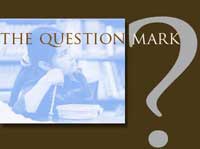| Research Cycle |
Order Kindle versions of Jamie's books
Order Jamie's books online with Paypal or a credit card
|
|
|
| Vol 11|No2|December |2014 | |
© 2007 Jamie McKenzie
|
Questioning the value
|
||||||||||||||||||||
| Instead of topical research, students should be asked to build meaning. They should wrestle with problems, struggle with challenges and convert information into understanding. They should not simply gather the opinions and judgments of so-called experts. A meaningful inquiry will puzzle them and delight them. Sometimes it will prove frustrasting, but that is as it should be.
The best research experiences will be built around questions of import. A truly great question will meet the following tests . . .
|
|||||||||||||||||||||
Questions of importLike essential questions, questions of import are worthy of our time but are also likely to spark interest and awaken curiosity. They require thought rather than the mere collection of facts or simple cut-and-paste thinking. No more trivial pursuit. How do they differ from essential questions? Essential questions tend to be grander than questions of import - exploring sweeping major issues of life that could serve as the basis for a year's study. They might even be worthy of a lifetime of study. Questions of import, on the other hand, while consequential, may sometimes be settled within the hour.
On the other hand sometimes questions of import may require weeks of inquiry.
Hopefully, our students will learn to generate their own questions of import when they scan the content being covered by the curriculum. Strategies for Converting Topical Research into True Inquiry
1. Decisions, Decisions, Decisions We ask students to make and defend choices. Instead of studying a single city, a single ship captain or a single poet, we challenge students to compare and contrast several cities, captains or poets.
2. Problems, Problems, Problems We ask students to come up with an action plan to address a problem or challenge taken from history or current society.
3. The Brilliant Question If schools do their job well, all students will strive toward the brilliant question, knowing that new knowledge, breakthrough thinking and invention all depend upon the brilliant question to unlock the mysteries of life and open the door to new possibilities.
Generating brilliant questions is a special talent that involves exploring the edges, the fringes, the dark side and the apparently irrelevant. This challenge is addressed fully in the February 2014 issue in the article "A Brilliant Question." |
|||||||||||||||||||||
Copyright Policy: Materials published in The Question Mark may be duplicated in hard copy format if unchanged in format and content for educational, nonprofit school district and university use only and may also be sent from person to person by email. This copyright statement must be included. All other uses, transmissions and duplications are prohibited unless permission is granted expressly. Showing these pages remotely through frames is not permitted. FNO Press is applying for formal copyright registration for articles. |


 © 2007 Jamie McKenzie
© 2007 Jamie McKenzie


